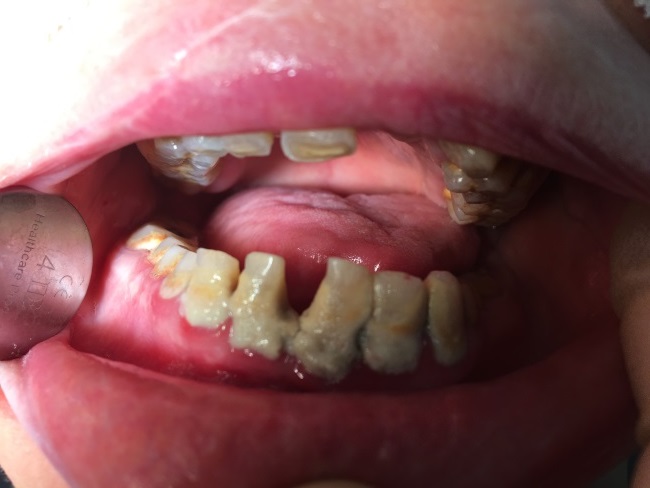Care Quality Commission Report
Feedback from providers indicates that since 2019, and the onset of lockdown, the proportion of residents never accessing NHS dental care routinely has grown from 6% to 25%. Those stating residents were always or mostly always able to access care fell from 67% to 35%.

The teeth of a 45-year-old female care home resident with learning disabilities and autism (c) Mili Doshi
We have long expressed concern over the postcode lottery of provision. Now this access gap appears to far exceed that of the wider population, putting the most vulnerable patients at risk. When the CQC issued its first report in 2019 we called for a revolution in the approach to oral health in care homes. We've seen hard won progress on awareness and training, but that all risks being undone.
The report continues to underline the difficulties delivering care under the failed 2006 NHS contract, with only 5% of contracts held in England including domiciliary care in 2021/22. Yes, the pandemic has caused disruption to dental services, but access for residents was extremely poor to start off with, and the responsibility to fix this rests firmly with government.
"For years we've needed a revolution in oral health in our care homes. Now real progress risks being undone as access to care falls off a cliff" said Giten Dabhi, Chair of our England Community Dental Services Committee.
"The Government must step up. Ministers have a moral duty to residents that can be left unable to eat, drink and communicate."
The CQC has also made the welcome call to make care home residents automatically exempt from patient charges. We've worked to expose the heavy-handed system that has seen hundreds of thousands fined for attempting to access free NHS dental care, and left many with complex needs facing penalties simply because their carers ticked the wrong box on a form.
We will also continue to call for reform of the NHS dental contract, and to ensure dental provision and commissioning is improved to meet the needs of the patients who need us most.
